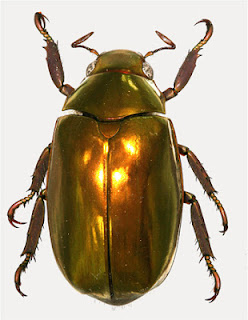 |
Chrysina
optima. Gold variant.
Image courtesy of the Generic Guide to New Word Beetles |
I can tell you it was a real pleasure working with David Hughes the co-founder at Electric Spec, who edited this story and really helped make it shine! If you want to know more about the inner workings of a successful online publication check out their blog, where the editors keep readers and writers apprised of what they're up to.
* * *
The Count is the Kingdom is the kind of story where a lot of dispirate ideas came together as I worked on it. I remember starting out with the image of a walled city that was actually a honeypot trap, collecting more and more people. To what purpose I had no idea, at least I didn't when I started writing. The first draft was actually a failed flash piece, so I started playing with some more ideas.
 |
| 15th century Catalan mappamundi |
I got to thinking about cartography and map making, and about how early explorers imagined the world. I had the thought that a census is a kind of topography of numbers that draws a map of a different kind inside our heads.
I can't remember what got me onto beetles, besides the fact that I'm raising a pair of tomboys and bugs are a constant topic of conversation. Ninety percent of the time a bug that wanders into our house is the subject of rescue not squashing. I spent a couple enjoyable hours researching scarabs and beetles while writing this story, especially how they figure in mythology.
I hope you enjoy reading it, I thoroughly enjoyed writing it.












